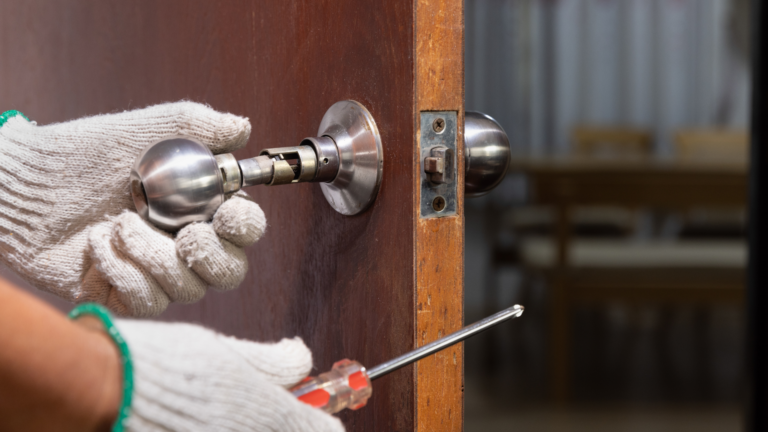While locks are fundamental for home security, they can have problems that compromise their effectiveness. Ensuring these issues are addressed promptly is crucial for ongoing safety. Here, we investigate typical lock issues, providing in-depth insights and extra solutions to maintain your locks effectively.
Locks That Stick or Are Tough to Rotate
Causes
Debris buildup, rust formation, and worn internal components are the main causes of lock faults. The lock mechanism may become clogged with dirt, dust, and other debris over time, making it difficult for it to operate. Rust production can result from exposure to moisture, especially in locks that are older or exposed to the environment. Furthermore, regular use might exacerbate lock issues by wearing down internal components.
In-Depth Solutions
If you’re comfortable disassembling the lock, do so. Then, using a soft brush and an appropriate cleaner, thoroughly clean the interior parts to get rid of any accumulated dirt and old lubrication. To keep locks in good working order, lubricate them frequently and keep the surrounding area tidy to avoid debris accumulation.
Misaligned Door Lock Components and Striker Plates
Causes
Doors and frames may move as a result of a building’s structural settling over time. Furthermore, variations in weather conditions can lead to materials expanding and contracting, possibly causing doors and frames to become misaligned.
In-Depth Solutions
To realign a door, start by using a screwdriver to tighten the hinges and adjusting shims as necessary. If the latch doesn’t line up with the strike plate, remove it and reinstall it in the proper location, which may involve using a chisel to create extra space. Additionally, weather stripping can be upgraded or replaced to ensure that the door runs smoothly and fits securely in its frame. This can also prevent future misalignment issues.
Broken Key Pieces
Causes
Over time, keys can lose integrity if they develop weak spots, especially with frequent use or exposure to force. Moreover, regular use wears down the metal and increases the likelihood of breaking.
In-Depth Solutions
Start by using a key extractor tool or a small jigsaw blade to carefully catch and extract the broken fragment of a key from the lock. It’s advised to regularly check keys for wear and create duplicates before they wear out. Steer clear of utilizing extensively worn keys to prevent breakage. If you are unable to remove the broken key, think about calling a locksmith for assistance; they have specialized equipment to safely retrieve them.
Locks that are Unstable or Wobbly
Causes
High-traffic areas often lead to locks becoming loose due to frequent use, which wears down their mechanisms. Poor installation of locks may cause them to become loose over time if they were not securely fastened initially.
In-Depth Solutions
Begin by removing the cover and tightening all visible screws to keep the lock functioning well. Ensure the lock mechanism is securely fixed to the door. Moreover, should you identify any worn-out components, replacing the entire lock mechanism may be essential to sustain its effectiveness.
Need a locksmith? Don't Worry!
Our expert locksmiths are available 24/7. We're here to help with all your emergency lock needs. Don't hesitate, call us now!
Key Won’t Insert Fully
Causes
Foreign objects or debris may block the keyway, disrupting the smooth operation of the lock. Furthermore, a bent or damaged key can hinder full insertion, impacting the lock’s functionality. Promptly addressing both issues ensures smooth key operation and maintains lock security.
In-Depth Solutions
Make sure your lock works properly by clearing visible debris from the keyway using a thin, non-metallic tool. Afterward, inspect the key for bends or damage and replace it with a new one if necessary to prevent future complications. Should the issue persist, it’s recommended to consult with residential locksmiths in Norristown, PA who can meticulously inspect and clean the lock’s internal components for optimal performance and security.
Lock is Frozen
Causes
Operational issues can occur if moisture inside a lock freezes during colder temperatures. In severe weather conditions, locks may freeze without adequate weatherproofing, impacting their functionality. It’s important to safeguard locks from the elements to prevent moisture buildup and freezing.
In-Depth Solutions
To thaw a frozen lock quickly, use a lock de-icer spray formulated with alcohol or similar substances to melt ice effectively. To repel moisture and guard against inclement weather, apply a lubricant prior to the colder months and install a lock cover. If the lock continues to be frozen, carefully heat the key with warm water or a lighter before inserting it to melt the ice inside the lock.
Homeowners may maintain dependable and safe locks by promptly resolving common issues and knowing when to hire a locksmith. Proper care, periodic upgrades, and consistent maintenance are necessary to maintain the integrity and dependability of your home’s locking systems.
When dealing with problems related to your home’s locks and seeking a solution, consider contacting residential locksmiths in Norristown, PA. We can handle a variety of lock-related problems thanks to our experience and specialized equipment, improving property security and providing comfort. Please give us a call right now!

